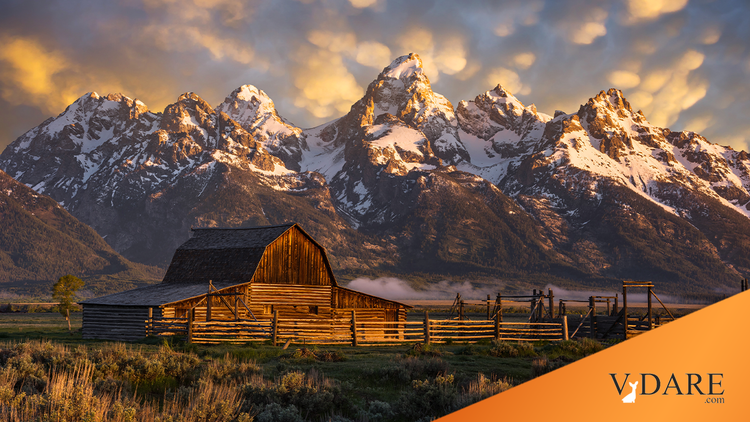


By Steve Sailer
09/12/2020
A press release from the U. of Cambridge:
‘Wild West’ mentality lingers in US mountain regions
Distinct psychological mix associated with mountain populations is consistent with the theory that harsh frontiers attracted certain personalities.
Friedrich Götz
When historian Frederick Jackson Turner presented his famous thesis on the US frontier in 1893, he described the “coarseness and strength combined with acuteness and acquisitiveness” it had forged in the American character.
Now, well into the 21st century, and researchers led by the University of Cambridge have detected remnants of the pioneer personality in US populations of once inhospitable mountainous territory, particularly in the West.
A team of scientists algorithmically investigated how landscape shapes psychology. They analysed links between the anonymised results of an online personality test completed by over 3.3 million Americans, and the “topography” of 37,227 US postal — or ZIP — codes.
The researchers found that living at both a higher altitude and an elevation relative to the surrounding region — indicating “hilliness” — is associated with a distinct blend of personality traits that fits with “frontier settlement theory”.
“The harsh and remote environment of mountainous frontier regions historically attracted nonconformist settlers strongly motivated by a sense of freedom,” said researcher Friedrich Götz, from Cambridge’s Department of Psychology.
“Such rugged terrain likely favoured those who closely guarded their resources and distrusted strangers, as well as those who engaged in risky explorations to secure food and territory.”
“These traits may have distilled over time into an individualism characterised by toughness and self-reliance that lies at the heart of the American frontier ethos” said Götz, lead author of the study.
“When we look at personality across the whole United States, we find that mountainous residents are more likely to have psychological characteristics indicative of this frontier mentality.”
The research uses the “Big Five” personality model, standard in social psychology, with simple online tests providing high-to-low scores for five fundamental personality traits of millions of Americans.
The mix of characteristics uncovered by study’s authors consists of low levels of “agreeableness”, suggesting mountainous residents are less trusting and forgiving — traits that benefit “territorial, self-focused survival strategies”.
Low levels of “extraversion” reflect the introverted self-reliance required to thrive in secluded areas, and a low level of “conscientiousness” lends itself to rebelliousness and indifference to rules, say researchers.
“Neuroticism” is also lower, suggesting an emotional stability and assertiveness suited to frontier living. However, “openness to experience” is much higher, and the most pronounced personality trait in mountain dwellers.
“Openness is a strong predictor of residential mobility,” said Götz. “A willingness to move your life in pursuit of goals such as economic affluence and personal freedom drove many original North American frontier settlers.”